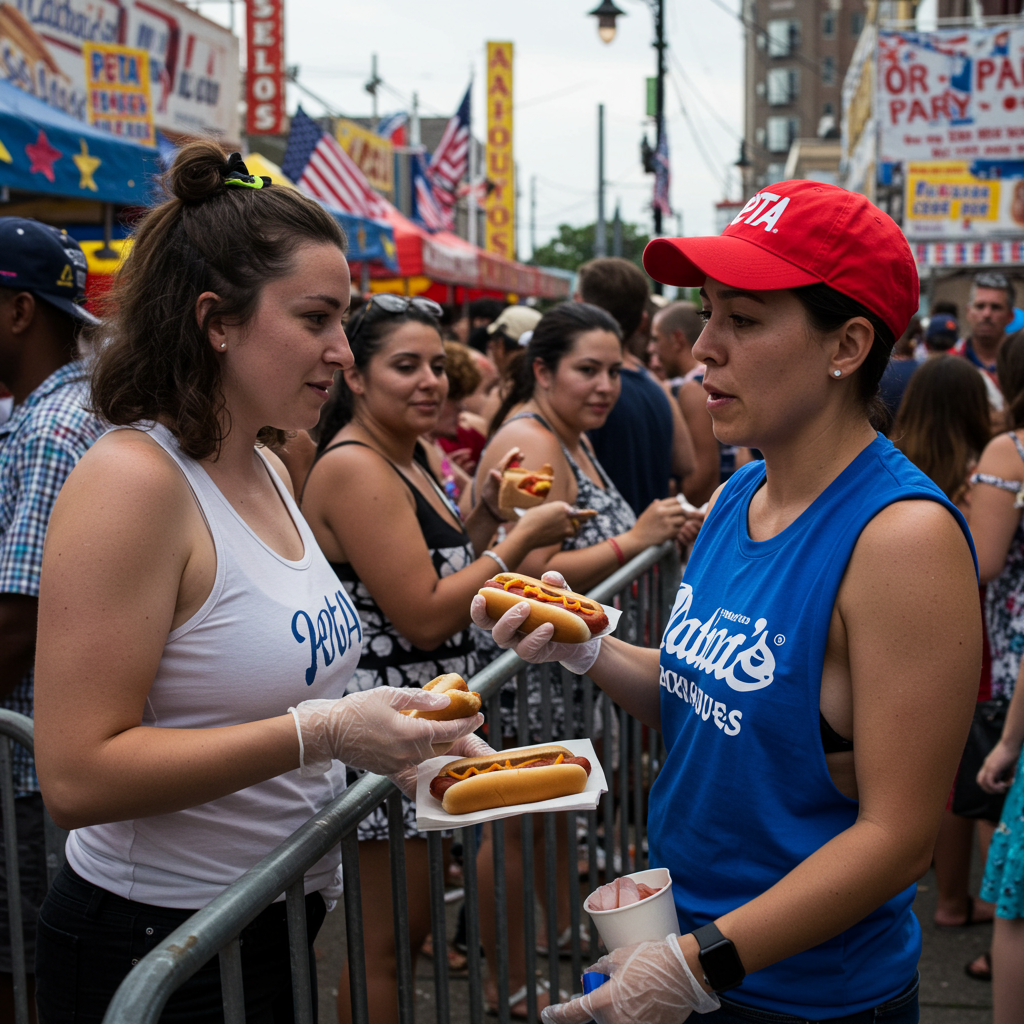Amidst the annual spectacle of competitive eating in Coney Island, a different kind of offering took center stage just outside the main event. While the world’s top eaters prepared to devour mountains of traditional hot dogs, the animal rights organization PETA (People for the Ethical Treatment of Animals) set up shop, providing free vegan hot dog alternatives to attendees. This deliberate presence during the high-profile Nathan’s Famous Fourth of July Hot Dog Eating contest highlighted the stark contrast between mass meat consumption and the growing movement towards plant-based options. The scene unfolded on Friday, July 4, 2025, drawing attention to PETA’s ongoing advocacy efforts.
Hot Dog Hero Returns to Coney Island
The focal point inside the competitive arena was the highly anticipated return of legendary eater Joey Chestnut. Chestnut, a dominant force in the sport, had notably missed the 2024 contest following a dispute related to his partnership with a plant-based food company, Impossible Foods. His comeback this year added a layer of intrigue, positioned directly against the backdrop of PETA’s plant-focused demonstration happening mere feet away.
Chestnut proved his mettle once again, reclaiming his title with an impressive performance. In just 10 minutes, he consumed a staggering 70.5 hot dogs and buns. This victory marked his 17th win in the last 18 contests, solidifying his status in competitive eating history. It was also the seventh time he managed to surpass the 70-wiener threshold, a feat few others have ever achieved. For context, the second-place finisher, Patrick Bertoletti, ate 46 hot dogs, illustrating the scale of Chestnut’s dominance.
PETA Promotes Plant-Based Alternatives
Outside the official contest area, PETA members were actively engaging with the large crowds gathered for the Independence Day event. their mission was clear: to promote compassionate food choices by distributing hundreds of free vegan hot dogs along the lively Coney Island boardwalk. Positioned near where vast quantities of traditional Nathan’s franks were being readied for the competition, the PETA team created a visual and experiential counterpoint.
Leading the effort was a character dubbed “Tommy Tofu,” who, alongside other PETA representatives, interacted with curious spectators. The goal was to offer a “flavorful Fourth that is also animal-friendly,” as PETA stated. The presence was intended as a direct challenge to attendees, urging them to consider the origins of their food.
The Message: Kindness Over Consumption
PETA articulated their stance clearly in statements made public during the event. Tracy Reiman, a PETA executive, emphasized the benefits of choosing plant-based options. “Vegan hot dogs are delicious and kind,” Reiman stated. She sharply contrasted this with meat production, asking rhetorically, “who really wants to support slaughterhouses — the word is enough — by buying what comes out of them.”
The organization framed their Independence Day message around the concept of broader freedom. “PETA encourages everyone to let freedom ring for all by leaving animals in peace this Fourth of July and beyond,” Reiman added. This connects the national holiday celebrating freedom with the ethical treatment of animals, urging a reflection on dietary choices.
A History of Activism at the Contest
PETA’s presence at the Nathan’s Hot Dog Eating Contest is not a new phenomenon. The organization has a history of using this high-profile event as a platform to advocate for animal rights and promote veganism. Their activities this year represent a continuation of this strategy, albeit less confrontational than some past instances.
In the year prior, PETA had planned a significant demonstration involving a truck aimed at “bombard[ing] the competition’s spectators” with their vegan message. While this year’s approach focused more on direct, positive interaction and free samples, it underscores PETA’s consistent view of the contest as an opportunity to challenge traditional meat consumption publicly. The event even has a history of direct protest interaction, such as the 2022 incident where a protester was physically confronted by Joey Chestnut himself during the competition.
The juxtaposition of PETA’s distribution of free, animal-friendly franks directly alongside an event centered on the rapid consumption of traditional meat hot dogs serves as a potent symbol. It highlights the ongoing cultural and ethical debates surrounding food sources, animal welfare, and the choices individuals make about their diet. PETA effectively leveraged the media attention surrounding the world-famous contest to amplify their message about compassionate eating on a day when meat consumption is a common tradition.
Frequently Asked Questions
What kind of hot dogs did PETA give away at Nathan’s Contest?
PETA members distributed free vegan hot dogs to spectators outside the Nathan’s Famous Fourth of July Hot Dog Eating Contest in Coney Island. Their goal was to offer an “animal-friendly” food option and promote plant-based eating alternatives to the traditional meat hot dogs featured in the competition.
Why does PETA protest or advocate at the Nathan’s Hot Dog Eating Contest?
PETA uses the Nathan’s Hot Dog Eating Contest as a high-profile platform to raise awareness about animal rights and advocate for veganism. The contest, which celebrates the consumption of large quantities of meat products, provides a stark contrast that PETA leverages to highlight its message about leaving animals in peace and choosing compassionate, plant-based food options. It’s a strategic location for direct engagement with a large public audience.
How many hot dogs did Joey Chestnut eat to win the 2025 contest?
Joey Chestnut ate 70.5 hot dogs and buns in 10 minutes to win the 2025 Nathan’s Famous Fourth of July Hot Dog Eating Contest. This victory marked his 17th title at the event and his return after missing the competition the previous year.
Conclusion
The 2025 Nathan’s Famous Hot Dog Eating Contest was notable not only for Joey Chestnut’s triumphant return and record-breaking consumption but also for the contrasting presence of PETA outside the venue. By distributing free vegan hot dogs and sharing their message about animal welfare, PETA effectively used the global spotlight on the contest to promote plant-based alternatives. This annual event continues to serve as a unique stage where the celebration of competitive eating intersects with the growing advocacy for compassionate and sustainable food choices, sparking conversations about what lands on our plates.



